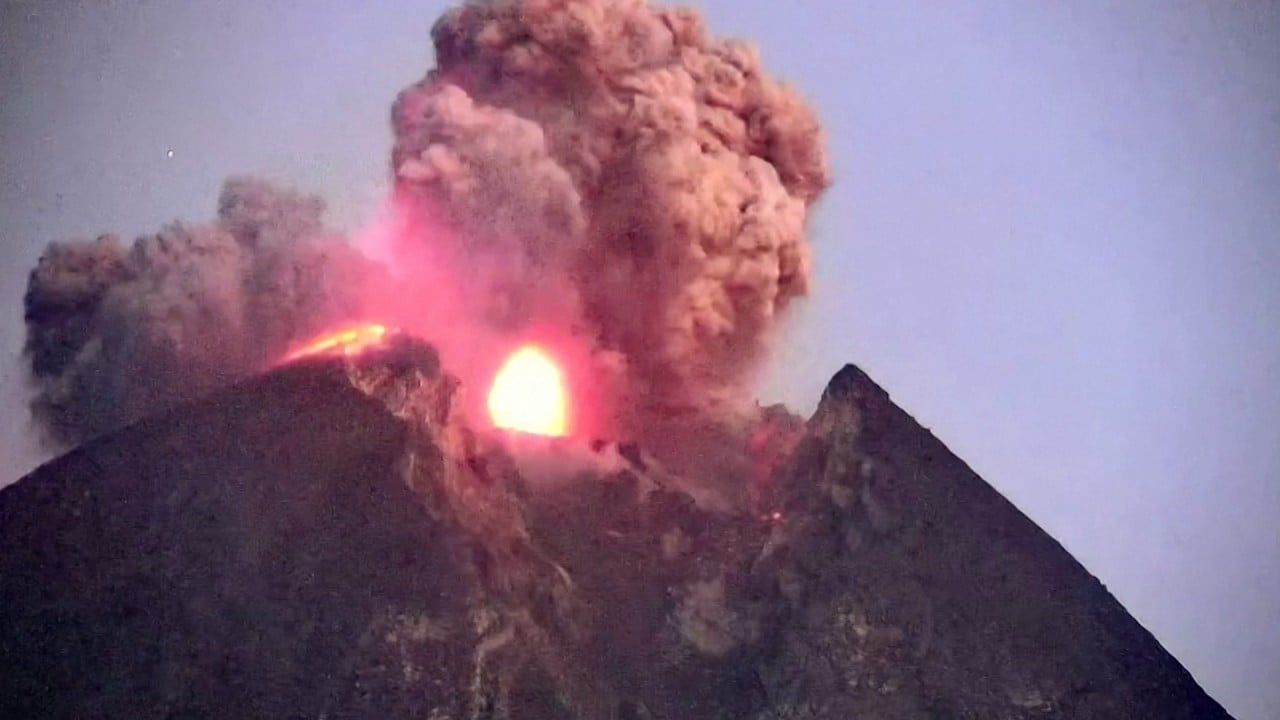
In Indonesia, deaths of 23 hikers at Mount Marapi spark accusations of negligence
- The presence of hikers at Marapi, one of Indonesia’s most active volcanoes, reveals local authorities had defied a years-long ban on visitors to the peak
- Local police are investigating if West Sumatra officials had made ‘procedural missteps’ in allowing people to visit the site
In 2011, Indonesia’s national disaster agency had barred people from going within 3km of the mountain’s peak after detecting increased activity at Marapi, one of the country’s most active volcanoes.
Yet, some 75 hikers and visitors were at the volcano when it erupted on December 3, spewing molten rocks and ash.

Sri Wahyuni, a 21-year-old university student from Riau, was among 52 people who escaped with their lives that day.
She and eight others were trekking down Marapi just before 3pm when they heard a massive explosion, followed by tremulous shaking of the ground beneath them.
“We’d been on top of the mountain in the morning. Luckily, we decided to head down back to camp after 12pm, so we were further down when the eruption occurred,” Sri said.
Stunned and confused, they leapt into action after rock fragments and ash started to rain down on them, accompanied by suffocating sulphurous fumes.
Fearing for their safety, the nine of them sped down the mountain as fast as they could, periodically seeking shelter under large trees. By nightfall, all of them, though badly shaken, had arrived safely at the foot of the mountain.
At 2,891 metres above sea level, Marapi – which means “fiery mountain” – has lived up to its name for the past two centuries, remaining active all this time. Its first recorded eruption took place in 1870.
After 149 years of dormancy, Marapi’s next major eruption occurred on February 23, 2014. In January this year, the mountain belched out volcanic debris, although no casualty was recorded.
Indonesia’s Geology and Disaster Mitigation Agency (PVMBG) raised the volcano’s alert status 12 years ago, urging local authorities to heed the warning.
“The ban was put in place because there’s no technology on Earth that is capable of predicting with great accuracy when an eruption might take place,” said Surono, the head of PVMBG at the time. “The agency can only issue bans and warnings, which are always disseminated to the local authorities. They alone have the capacity to enforce them.”

Many Indonesians, both online and offline, have questioned why West Sumatran authorities continued allowing visitors to the site.
“My understanding is the mountain was off-limits to visitors, so an inquiry must be held into why hikers were allowed in,” said Riza Novara, a hotelier based in Bukittinggi, a town 25km away.
The eruption engulfed Bukittinggi in a shower of volcanic sand and ash for two consecutive days, said the 56-year-old owner of Hotel Primadini. “In my 10 years in Bukittinggi, it was the first and worst time of being impacted by Marapi’s eruption. In the past, the wind blew the other way and we were spared the ashes.”
Riza said he was appalled the authorities in West Sumatra seemed to have ignored a national ban in favour of selling tickets to enthusiastic hikers. “This is obviously a criminal offence and the police must take the initiative to lead a thorough investigation.”
‘I don’t want to’: survivor of Indonesia eruption vows to never hike again
In July, having just taken over the management of Marapi and its environs from local residents, West Sumatra’s Environmental Conservation Agency (BKSDA) launched an “online booking system” for those wishing to climb the mountain.
BKSDA claimed it would apply a quota of between 100 and 150 persons on Marapi on any given day “to minimise environmental damage”, charging visitors an entry fee of 5,000 rupiah (US$0.32) on weekdays and 7,500 rupiah (US$0.48) on weekends.
In the aftermath of the eruption, BKSDA is now under police investigation over possible negligence.
“We will focus our investigation on whether there were procedural missteps in allowing so many hikers in the vicinity of the volcano when the disaster struck, leading to so many deaths,” West Sumatra Police spokesman Dwi Sulistyawan said.
Negligence resulting in the death of another person is a criminal offence punishable by up to five years’ imprisonment under Indonesian law. But no suspect has been declared in the case yet.

The high death toll resulting from the recent eruption has also led to suggestions that BKSDA should involve locals in managing Marapi and its surroundings.
Novia Harlina, a reporter with Indonesian news outlet Liputan6 who was on site during the recent evacuation process, said that ever since local residents were cut off from the management of what is now a national park, they had been denied the economic benefits of its existence.
Local residents used to monitor entry, charge visitors and serve as guides, turning away hikers when they deemed the volcano unsafe for climbing.
“The locals are obviously the people who know the terrain best. They have managed to live and survive the volcano so far,” she said.
Are Japanese authorities doing enough to locate missing foreign travellers?
Despite their exclusion, around a hundred volunteers from nearby Batu Palano village were the first to climb up Marapi, before rescue teams and other first responders arrived to evacuate survivors and extricate bodies last week, Novia said.
Meanwhile, barely two weeks after the eruption, life in West Sumatra is already returning to normal.
Novia told This Week In Asia that as of Monday, local residents were already returning to their daily routines.
“People here say they are used to Marapi throwing a tantrum once in a while. Their livelihoods are rooted around the mountain, be it farming or other rural economic activities,” she said.


